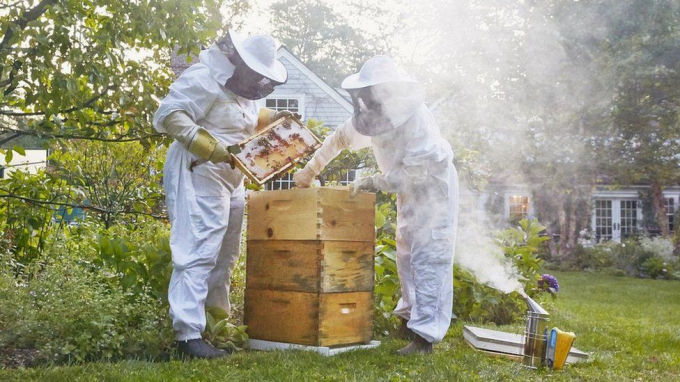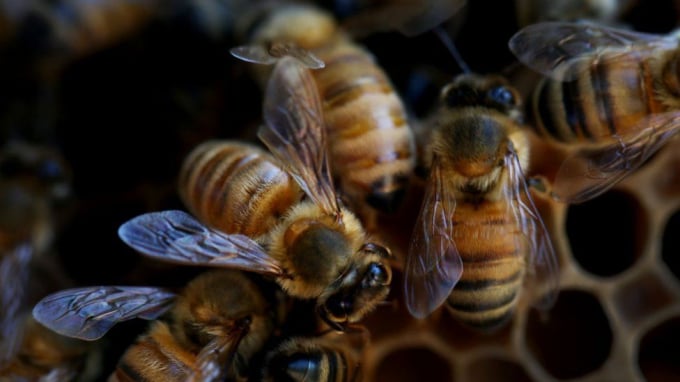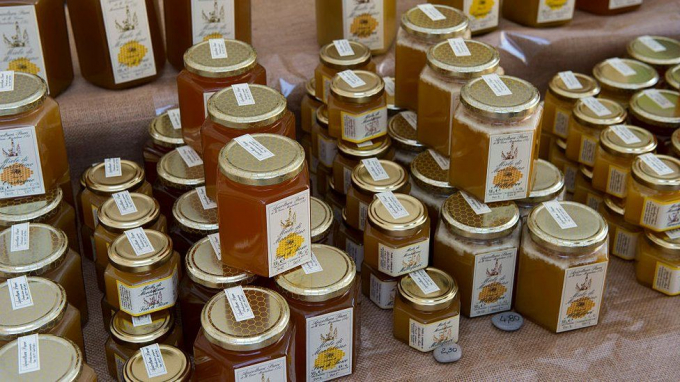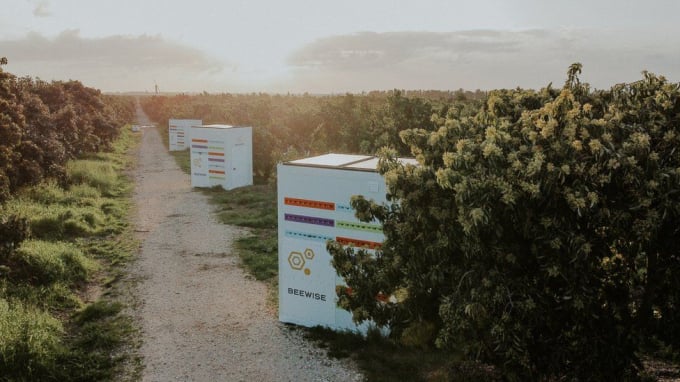May 16, 2025 | 06:51 GMT +7
May 16, 2025 | 06:51 GMT +7
Hotline: 0913.378.918
May 16, 2025 | 06:51 GMT +7
Hotline: 0913.378.918

Best Bees Company allow homeowners to host beekeepers' hives - in return for honey
Noah Wilson-Rich, chief scientific officer of US firm Best Bees Company, says it is distressing how many American honey bee colonies, or hives as they are otherwise known, die off every year.
Hit by a deadly parasitic mite, pesticides and climate change, a survey showed that between April 2019 and 2020 43.7% of US hives were lost. That was the second-highest annual figure since that particular study started in 2010.
"That just shows how messed up things are currently," says Mr Wilson-Rich.
His Boston firm installs hives on commercial and residential properties - everywhere from roof tops to back gardens. Its staff then use an advanced software system to monitor and record the health of all the bee colonies.
The data is shared with researchers at Harvard University and Massachusetts Institute of Technology, to help them better understand the plight of the insects.
Best Bees, which is paid by the homeowners and businesses, also harvests and bottles the honey for them to keep.

The honey bee faces a number of pressures
"We are looking at why thriving beehives live," says Mr Wilson-Rich. "We need to understand why they're doing better. With that research data we can get wonderful benefits... it is telling us how the bees are actually doing."
With the global honey industry worth an estimated $9.2bn (£6.5bn) in 2020, there is also a significant commercial imperative behind the increased use of technology to monitor and look after bees. Especially at a time when the coronavirus pandemic has focused minds on wider food supply issues.
One firm also at the forefront of the honey bee industry is Irish business ApisProtect, which makes wireless in-hive sensors that collect and transmit data to a website-based "dashboard".
"We collect temperature, humidity, sound and acceleration [of the bees flying out of the hive] data," says chief executive Fiona Edwards Murphy.
"What we do is extract those raw data points and then use machine learning to convert that into useful information. We tell the beekeeper, for example, which hives are growing and which hives are shrinking, or which hives are alive and which hives are dead."
The technology, she adds, marks a significant shift from traditional beekeeping practices, whereby beekeepers have to manually inspect hives. In the US, where some of the very largest beekeeping firms have more than 90,000 hives, that is a lot of work.
"In a commercial operation only about 20% of hives at any given time need intervention," adds Ms Edwards Murphy. "The problem is that beekeepers don't know which 20%. They literally go out and pick around a hive to see if it's the one they should be looking at.
"What we do is enable them to get a picture of what's happening in all their hives, spread across a large area, before they even leave their office in the morning. For commercial beekeepers, we see a 50% reduction in labour costs. That obviously has a huge impact on the business of beekeeping."
Israeli firm, Beewise, aims to reduce the need for human intervention even further.
It has created the "Beehome", a large solar-powered box-shaped structure that can house 24 separate hives.

Honey is a vast global industry
Able to operate autonomously, or via an app on the beekeeper's phone or tablet, each Beehome comes with an array of cameras, sensors and robotic arms that together take over the actions that would otherwise need a human hand, such as pest control, swarm prevention, and harvesting the honey.
The only actions that require human intervention are ensuring that the bees have access to a food source and water, and going to retrieve the machine-harvested honey.
"In a regular beehive, with a wooden box, there's about 10,000 to 50,000, or maybe even 100,000 bees," says Beewise chief executive Saar Safra.
"That's a lot of data to analyse, and the AI [artificial intelligence] is doing it in split seconds. It can identify what's going on, and apply the right treatment."
He adds there is "a lot of stress on bees today", but that "commercial beekeepers can really help these issues". "The idea is that helping these living creatures is important in real time, or shortly thereafter. If you wait too long, a small concern might evolve into a huge issue, and then a collapsed colony."
An even more futuristic bee tech project is the pan European Hiveopolis scheme, which is studying the possibility of putting tiny "waggle dancing" robots inside hives to influence bee behaviour.

The Beehomes from Israeli firm Beewise can hold up to 24 hives
While no photos are available, and the technology is said to still be in an early stage, the idea is that the robots will try to imitate how bees communicate using movement. And from that the hope is that the robots will be able to direct the worker bees to the best sources of nectar.
"It is important that we can tell the bees where they should fly and collect, but also that we are able to tell where the nectar was collected from," says Thomas Schmickl, a Hiveopolis researcher at the University of Graz in Austria.
"A jar of honey from such a colony could have a sticker with a sort of Google Maps overlay, indicating the harvesting place.
"People would know where the honey is coming from - this would be of interest to the consumers."
(BBC)

(VAN) Fourth most important food crop in peril as Latin America and Caribbean suffer from slow-onset climate disaster.

(VAN) Shifting market dynamics and the noise around new legislation has propelled Trouw Nutrition’s research around early life nutrition in poultry. Today, it continues to be a key area of research.

(VAN) India is concerned about its food security and the livelihoods of its farmers if more US food imports are allowed.

(VAN) FAO's Director-General emphasises the need to work together to transform agrifood systems.

(VAN) Europe is facing its worst outbreak of foot-and-mouth since the start of the century.

(VAN) The central authorities, in early April, released a 10-year plan for rural vitalization.

(VAN) Viterra marked a significant milestone in its carbon measurement program in Argentina, called Ígaris, reaching 1 million soybean hectares measured.